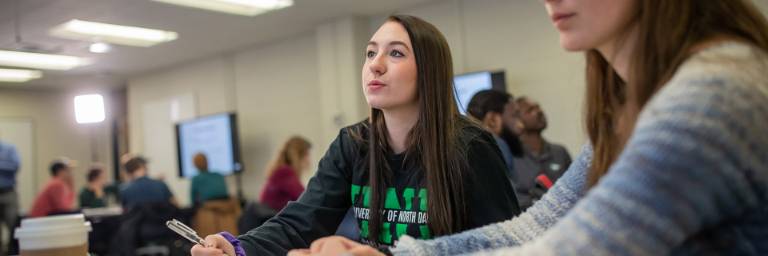Online Master’s in Applied Statistics
Immerse yourself in the study of applied statistics and build your analytical thinking and problem-solving skills.
Transform raw data into actionable insights with UND’s 100% online master’s degree in Applied Statistics. Learn to solve complex problems using modern statistical methods, tools, and techniques – all on your schedule.
- Program type:
- Master's Degree
- Format:
- Online
- Est. time to complete:
- 2 - 3 years
- Credit hours:
- 33
Why choose UND’s online master’s in Applied Statistics?
-
UND’s Master’s in Applied Statistics
-
Take courses in multivariate statistics and time series.
-
Learn to harness the power of Python, SAS and R software.
-
No GRE required. Plus you can complete the program 100% online and never come to campus.
-
Gain a competitive edge through UND's career & professional workshops. Our events focus on workforce readiness and provide immersive job training for graduate students and postdoctoral researchers.
-
Study at a Carnegie R1 Institution ranked #144 by the NSF. In 2025, just 187 American universities held the R1 status.
-
Enhance your professional skills at 60+ free workshops offered through the UND School of Graduate Studies. Our goal is to provide you with the workforce skills and job search strategies to succeed.
Skills You’ll Develop in UND’s Online Applied Statistics Program
UND’s M.S. in Applied Statistics prepares graduates with essential skills for data-driven industries, enabling careers in data science, business analytics, healthcare, finance, and more.
-
Statistical Analysis: Master core statistical techniques such as regression, ANOVA, and multivariate analysis.
-
Data Visualization: Create compelling and clear visual representations of data using tools like Tableau, R, and Python.
-
Predictive Modeling: Build and validate models to forecast outcomes and make data-driven decisions.
-
Machine Learning: Gain foundational knowledge in supervised and unsupervised learning techniques for big data applications.
-
Programming Proficiency: Develop expertise in statistical programming languages, including Python, R, and SAS.
-
Big Data Management: Work with large datasets and use cutting-edge tools for data cleaning, transformation, and analysis.
-
Experimental Design: Design, implement, and analyze experiments to draw valid and actionable conclusions.
-
Problem Solving: Use advanced problem-solving techniques to address complex data challenges in diverse fields.
-
Communication: Translate technical findings into actionable insights for both technical and non-technical audiences.
Career Outcomes with a Master’s in Applied Statistics
Courses You'll Take
Why UND Online?
MAS FAQs
To qualify for our MAS program, prospective students must have completed courses analogous to:
- Calculus I
- Calculus II
- Calculus III
- Introduction to Linear Algebra
- Applied Statistical Methods
- Computer Programming
No, a thesis is not a requirement for obtaining the MAS degree. The level of comprehension in applied statistics is assessed through comprehensive examinations that cover two general areas approved by the candidate's faculty advisor. This program does an independent study or an internship including statistical applications.
Admission into the MAS program is contingent on meeting the School of Graduate Studies' general admission criteria. While candidates from diverse academic backgrounds, including but not limited to engineering and computer science, are welcome, a fundamental proficiency in calculus, linear algebra and statistics is essential.
Our MAS program takes 2-3 years to complete, providing students with sufficient time for gaining a thorough understanding of applied statistics.
Our MAS program equips graduates with the necessary skills and knowledge for pursuing diverse career opportunities, including roles such as statistician, actuary, business analyst, data engineer, data mining analyst, data scientist, data visualization expert, financial quantitative analyst, and statistical software designer. The vital contributions that professionals with a master’s in Applied Statistics can provide for organizational processes, including decision-making, risk assessment, and data analysis, position them as valuable assets across various industries.
Leaders that Do
Students at UND take chances, seek challenges and become leaders in the community.
